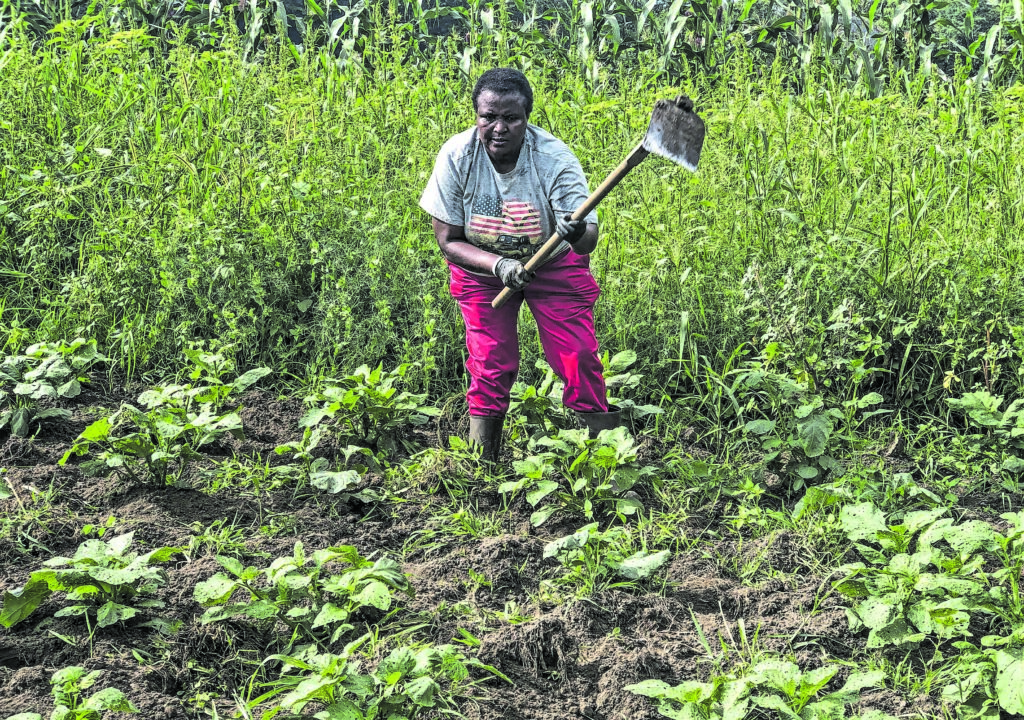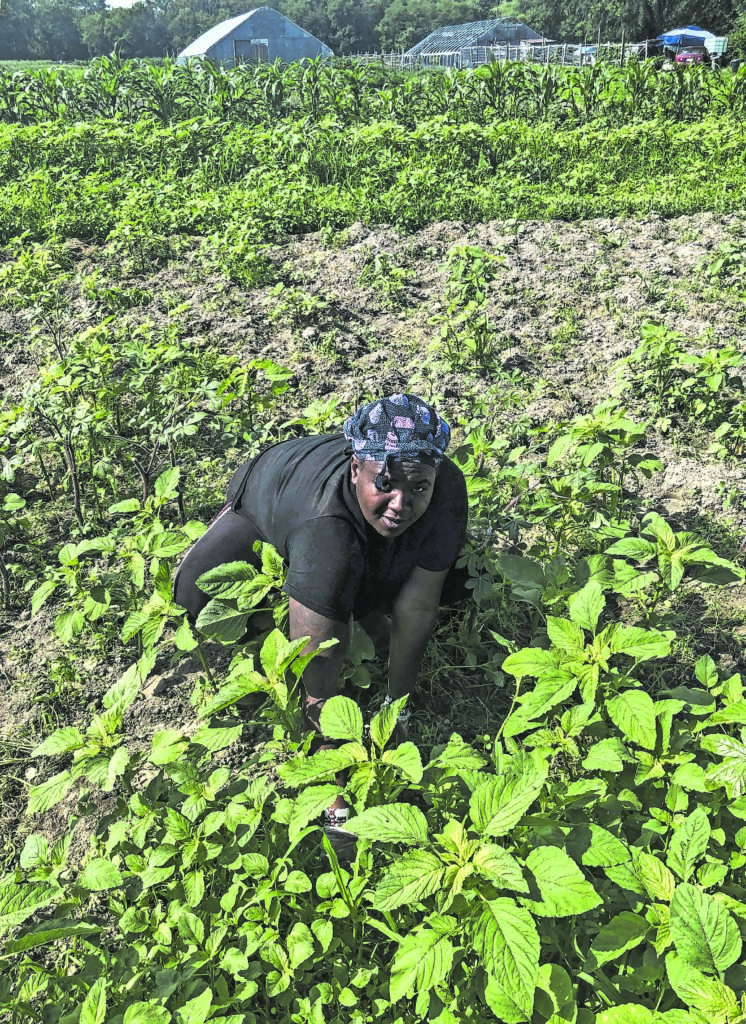For Henrietta Moraa Nyaigoti (left), who learned how to farm from her mother (right), farming became a family Sunday ritual. They now run a commercial venture selling vegetables to Kenyan expats, such as these women from from Boston.
The land in front of me, with fewer than 20 baby corn and coriander plants, looked more like a community garden than a farm. Panicked, I checked the address in my email against that on my GPS. I was in the right place, but it looked nothing like the sprawling farm with greenhouses I’d seen on Facebook photos and videos.
I had driven three hours from New York to Massachusetts to buy Kenyan vegetables and prayed I would not be disappointed. I didn’t realise the wealth of vegetation I was about to be exposed to; I was simply sitting in a driveway.
“I’m delivering produce and will be home in 15 minutes,” Henrietta Moraa Nyaigoti, the farmer I had come to see, said when I called to let her know I’d arrived. My city life, where after-hour cocktails were the height of connection, had made me forget my culture. Of course I would be invited into the family home first, before heading out to the farm.
I met Ms Henrietta in a Facebook group for Kenyan gardeners in the United States. I did not garden or farm. In fact, my plants constantly died because of the lack of light in my apartment.
A well-meaning friend added me to the group, and I was glad she did, because it opened my eyes to how many Kenyans were committed to growing our indigenous and mainstream crops, for both subsistence and commercial purposes.
In the group, recipes and pest-fighting strategies were traded, along with best practises for canning and drying for the winter months. Sales referrals were generously shared. Farming was not an option when many in the group first migrated to the US. Education, specifically one that offered a path to a high-paying white-collar job, was the dream.
Many Kenyans in the group had worked double shifts and gone to school to get coveted degrees. They had relatives bring dried indigenous produce from home, or bought some, like pumpkin leaves, from the Amish and Chinese in Pennsylvania. Now, growing their own produce for their families and for their communities is something they balance with their day jobs.
 Henrietta’s mother harvesting.
Henrietta’s mother harvesting.
Someone tagged Henrietta when I posted about wanting to buy chinsaga, or African spider wisp, for a taste of home. I was nostalgic. Covid-19 had derailed my plans to visit my homeland in 2020.
Henrietta offered to ship dehydrated chinsaga to me, but I really wanted to breathe in the peppery, balsamic aroma of its freshly picked leaf. Cooped up in my apartment for months, a road trip to a farm was a fairly safe, socially distanced activity. My husband was up for the ride, although Iris, our in-heat and prone-to-motion-sickness dog, might have opted out if she could speak.
Two other Kenyan women who had driven an hour from Boston, also to buy fresh produce, pulled into the driveway, too. Soon, our masks on, we drove 10 minutes to the farm I’d seen on Henrietta’s Facebook Lives.
Henrietta is one of many Africans who farm on Massachusetts Flats Mentor Farm. She never imagined this was a path she would take. Her mother, a teacher, had leased the land to farm to feed her family, and had hoped that her children would join her and make it a family bonding time.
Henrietta had had other goals. She wanted to study psychology and hang out with the cool kids. Gardening in the wee hours of the morning was not on her vision board, although she enjoyed the kunde (cowpea leaves), chinsaga, terere (amaranth), and managus (African nightshade) her mother harvested for them to eat every day.
Once, when her mother had worked double shifts and was exhausted, Henrietta volunteered to help her to harvest. It was only after working that whole morning in the fierce sun, back strained, sweat dripping down her face and chest, that she appreciated what her mother endured to put food on the table. Exhausted, she collapsed on her bed when they returned home.
“My mom had been doing this for 15 years! I started to appreciate what I took for granted. She was overworked and the food was for the family,” Henrietta said. Farming became a family Sunday ritual, while her other days were spent completing her psychology degree.
In 2012, with her financial savvy and digital marketing expertise, she convinced her mother, who had been giving away excess produce — whatever the family could not eat themselves — to friends and family, to consider the cost of her labour and go commercial.
The Flats Mentor Farm is located on a 70-acre river-bottom parcel of land in Lancaster, Massachusetts. Founded in 1984, the farm provides the space and infrastructure for small immigrant and refugee farmers to get started.
“There are institutional barriers to land access. It’s hard for immigrants who are not white and named Smith to own land,” said Maria Moreira, who founded the farm. “My family migrated from Portugal in the 1960s and it was extremely difficult to purchase land if you hadn’t owned land. It’s still hard today.
 Henrietta Moraa Nyaigoti
Henrietta Moraa Nyaigoti
“Food is an intricate part of our cultural makeup and it makes sense that we all want to feel connected to the earth and our indigenous culture wherever we are. So when a Hmong Chinese woman showed up on our dairy farm in the spring of 1983 and asked if she could till a portion of our land, my husband and I immediately said yes.”
Like Henrietta, the farmers at Flats Mentor Farm produce speciality crops, supplying to wholesale and retail markets throughout New England, including more than 40 farmers’ markets and dozens of small-scale, direct-to-consumer outlets in and around Massachusetts.
Recently, the federal government provided a grant to build a commercial kitchen in which farmers could process their produce for sale. The farm has more than 300 farmers: 92% are from across Africa, and more than 60% are women.
“The influx of African farmers was all based on community — one farmer bringing a friend. Many of them move on when they want to scale [up] or move to other states in the South or the West Coast where land is cheaper. But their spots are quickly filled,” Moreira said.
Community means more than just supporting her farmers. After Covid-19 hit America and interrupted the country’s food supply, she assembled the World Farmers Organization, a group she co-founded, to buy food from producers like Henrietta and to supply 1 120 free food boxes to local communities.
“Here, we don’t romanticise farming. We are concerned about food security and equality,” Moreira said.
The farm was like a furnace when we arrived; the greenery a mirage under the harsh light. While Iris and my husband sought shade, the two ladies from Boston, Henrietta and I explored the greenhouses. I immediately smelled the managus and chinsagas, suddenly missing my childhood produce-washing and cooking on Sundays with my mother.
Back at Henrietta’s home, her sister, Violet Guto, had cooked a hearty Kenyan meal of ugali and chinsaga, accompanied with milk cultured in a gourd, for all six of us. We mused about the wealth and benefits of African delicacies, and how we completely lacked the marketing abilities to make our food mainstream, like Koreans did with kimchi and the Russians with kefir.
Henrietta grows Brazilian eggplant, kale, collard greens, zucchini, cucumbers, beetroot, radish, mint, amaranth, and herbs for the local supermarkets and the Kenyan foods for her long list of customers, which now included me.
Driving home with three boxes of goods, the smell of fresh mint wafting through the car, I dreamed about all the ways I’d cook up my riches. Maybe I could replace broccoli rabe with the bitter managu in my pasta. Perhaps chinsaga could make a good massaged salad with a red-wine dressing. Selfishly, I hoped that our foods remained a secret.
This feature first appeared in The Continent, the new pan-African weekly newspaper designed to be read and shared on WhatsApp. Get your free copy here.